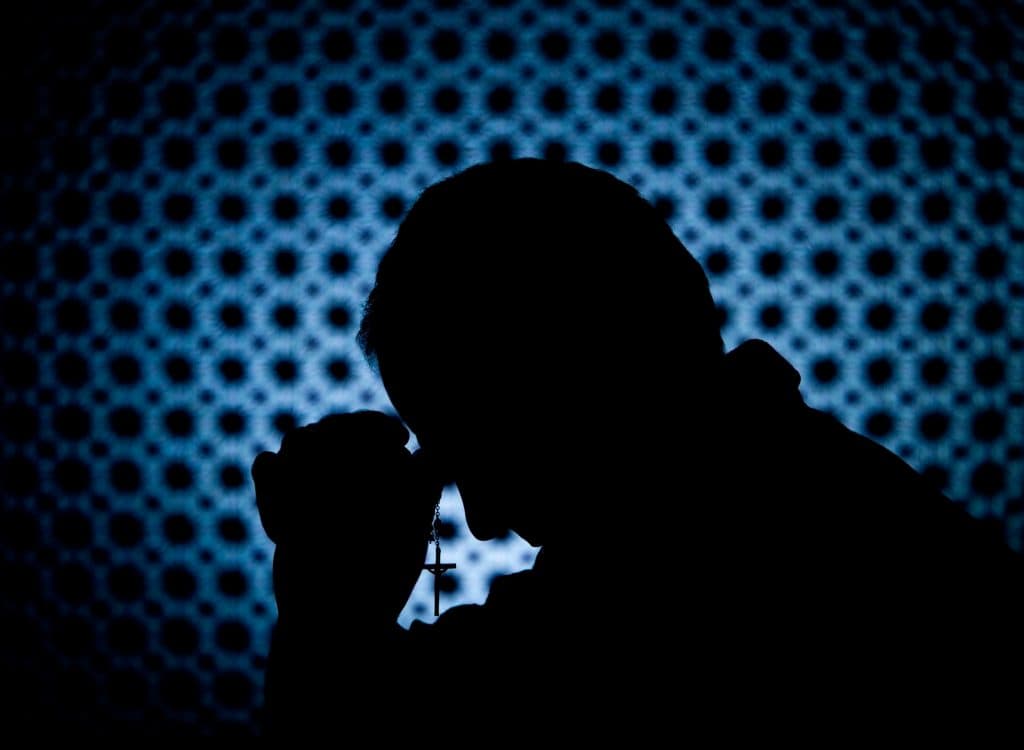Even if you don’t know Terry Crews by name, you’ve seen his face. The former NFL player-turned-actor has been in TV shows (such as Brooklyn Nine-Nine and Arrested Development) and movies (such as Idiocracy and The Expendables) and Old Spice commercials. He’s hosted awards ceremonies (such as the 2017 MovieGuide gala). And he has a lovely wife and five children to round it all out.
And yet, despite all his outward success, he also had a porn problem. “If day turns into night and you are still watching [porn],” he explained, “you’ve got a problem.” It wasn’t until his wife, in a screaming match over the phone while he was on set, told him not to bother to come home that he finally sought freedom through technological solutions (including Covenant Eyes) and through therapy (for both him and his wife). And almost a decade later, they’re still together, and Crews is porn-free.
But he’s more than porn-free. He and his wife are open about the problem, about how it made him objectify women, and about how shame in particular—the belief that you are bad—kept driving him back to porn. “When you believe you are bad, you go right back to the dirt,” he explained in a Facebook Live video.
Why Willpower Alone Will Fail You
The solution Crews found was not mere willpower. In moments of weakness, like when you’re hungry, angry, lonely, or tired, willpower will fail. You’re relying on mental fortitude alone to fight against neural pathways that have been carved into your brain since the first time you made the choice to view porn. That’s why going cold turkey doesn’t work.
Think of your triggers—your anger, your stress, even your visceral responses to seeing a photo of friends in swim suits on the beach—as a mountain stream. If there’s just a little bit of water, like a minor deadline, it’s easy enough to divert the stream. But if there’s a lot of water, a “rainstorm” of sleepless nights and job stress and a sick kid and lingerie ads on Facebook, it becomes much harder. The water naturally pours down the preexisting channels, and eventually into the same old scuzzy swamp of pornography. And willpower alone is like trying to block the water with your foot without giving it anywhere else to go.
The Power of Self-Discipline
That’s where self-discipline comes in. We’re not talking about punishment, like a parent spanking their child, but rather like an athlete who works with a coach to strengthen her body. In our stream analogy, if willpower is trying to block the water, then self-discipline is digging trenches to send the water away from the pond, into a reservoir or a crystal clear lake or waterfall. It’s taking the stresses and making something useful or even beautiful out of them.
Crews identifies five steps to self-discipline:
1. Remove temptations.
For Crews, this meant deleting his Twitter account and other sources of temptations, and installing Covenant Eyes on his computer.
2. Develop healthy eating and sleeping patterns.
The acronym HALT describes four of the most common porn triggers: hunger, anger, loneliness, and tiredness. If two of the four terms in HALT are literal physical states—hunger and tiredness—then setting yourself a bedtime and eating regular, nutritious, filling meals will reduce the stress that leads you to porn.
3. Do something else, and don’t wait for it to feel right!
Channel all of your anger and loneliness into something creative. As Crews says, “Sexual energy is creative energy.” Doing something else, like picking up a book or playing guitar or running a mile instead of watching porn, will feel awkward and uncomfortable at first, but that’s because you’re digging new neural pathways. You’re telling your brain that the old way of responding is wrong, and you’re sending it to do something new. Eventually, these new practices will become habits, and your old way of doing things, of fleeing to pornography, will fade away.
4. Celebrate your victories.
Obviously, porn shouldn’t be part of your celebration, but schedule breaks, treats, and rewards for yourself. Maybe you treat your family to a fancy meal out for every two weeks that you’re porn-free. Or buy yourself something cool that you’ve been eyeing. If you’re focusing on a creative hobby instead of porn, like drawing, celebrate accomplishments there too. Maybe you drew for two hours instead of watching porn. Maybe you drew something that you’re particularly proud of. Celebrate those accomplishments!
5. When you trip up, forgive yourself and move forward.
You may fail, especially early on. You’re working against years of porn habits. Of course you’re going to go down the wrong trail. The important thing is to pick yourself up, dust yourself off, and keep moving forward. Don’t wallow in self-pity, don’t beat yourself over the head, and most importantly, don’t give up! You didn’t dig the original channels to the swamp of porn in a day; you’re not going to solve them in a day, or even necessarily a month or a year. But that doesn’t mean you should just give up. Keep on trying, and eventually you will train yourself away from pornography.
Related: In Case of Relapse
How to Get Started with New Habits
We frequently cover the first point here at Covenant Eyes, and the second, fourth, and fifth are all fairly self-explanatory. But what about the third? What about those new habits we’re supposed to build?
Think back to your childhood. You have a pretty good idea of who you want to be now, but who did you want to be back then, when you were five and ten and fifteen? Did you spend all your free time writing or drawing? Did you rock out on air guitar to your favorite bands? Maybe you spent your free time collecting bugs, or trying to build machines out of LEGOs. Often what we did in childhood points us to things we’d truly enjoy as adults.
Of course, your childhood may have been disrupted by porn or other abuses, and you never had a chance to mess around with hobbies. Or your parents forced you into soccer games and other after school activities, and you simply didn’t have the time to figure out what you liked. That’s okay! Regardless of whether you’ve dreamed of learning guitar since you were three, or whether you were dirt poor and your most valuable toy came from a fast food kid’s meal, this should be a time to explore and try new things.
In our ebook Hobbies and Habits (which is now available!), we cover seven different types of hobbies:
- Creative hobbies
- Physical hobbies
- Practical hobbies
- Intellectual hobbies
- Experiential hobbies
- Generous hobbies
- Social hobbies
As you read over them, it will feel like a lot! But don’t let information overload get you down. Start by reading over the book, and make notes on one or two things from each category. Then pick one thing to try out first. If it sticks, great! If not, go back to your list and try out something else.
Don’t be afraid to experiment as you try out different hobbies, and feel free to jump around and try something different from day to day—but make sure you try out each hobby on a good day; don’t judge whether you enjoy it on the days you’re already frustrated and on the brink of viewing porn.
You may try something out and dislike it immediately. Or you may find a hobby that you enjoy for a few weeks, but you grow quickly bored with it. That’s okay! You’re exploring and looking for what sticks. In the end, you’ll likely find one or two core hobbies that you truly love, and that help transform your world.
This article is excerpted from the new ebook Hobbies and Habits. Download it today!








Please tell me some alternate method of paymen trather than MasterCard, visa etc
Hello Anuraag! Currently, we’re only able to accept payment via credit card. However, if you’re having problems making a payment, please reach out to our support team at support@covenanteyes.com and see how we can help. You can also take advantage of the many free articles and resources available through our website!
Blessings,
Keith
This article caught my eye because what I read has worked out in my experience. I am a Roman Catholic who has grown in prayer—a definite support a recovering addiction to porn. This supplemented a new spiritual director and other proactive steps. More recently my reaching out to various God-centered groups has also helped (Exodus 90 and That Man Is You). Admittedly these focus on men and seem to ignore this problem in women. There must be similar activity groups for women, but I do not know. I had just begun to interact with a Sexaholics Anonymous (SA) meeting nearby when the Covid-19 closures began. I will seek to find some sort of online SA group chat until the dust settles and would others in our situation to do the same. They also sponsor a similar support group for spouses of addicts.
I need help
Harriet,
I am not sure what you are struggling with, but I want to encourage you with Psalm 46:1 – “God is our refuge and strength, an ever-present help in trouble.”
Do not give up hope! I would also encourage you to turn to a friend, relative, spouse, church leader, counselor – anyone who can hear your struggles and walk with you on this journey. We at Covenant Eyes can also offer accountability for your technology.
Praying for you, friend.
Blessings,
Moriah
I’ve really liked this part a lot, “Often what we did in childhood points us to things we’d truly enjoy as adults.”. And I completely agree with the post. You can’t use up that energy in thoughts of how to avoid porn. It needs to be channeled to something constructive. I speak from experience. Again, you need as much help as you can get. Digging those trenches to direct the waters requires assistance. A close friend or your spouse can help you in digging in directing your energy else where by coming up with great constructive hobbies for example. Remember, when the road seems all uphill and you are tired and have no will, rest if you must but DON’T you quit.
Thank you Lisa for sharing.